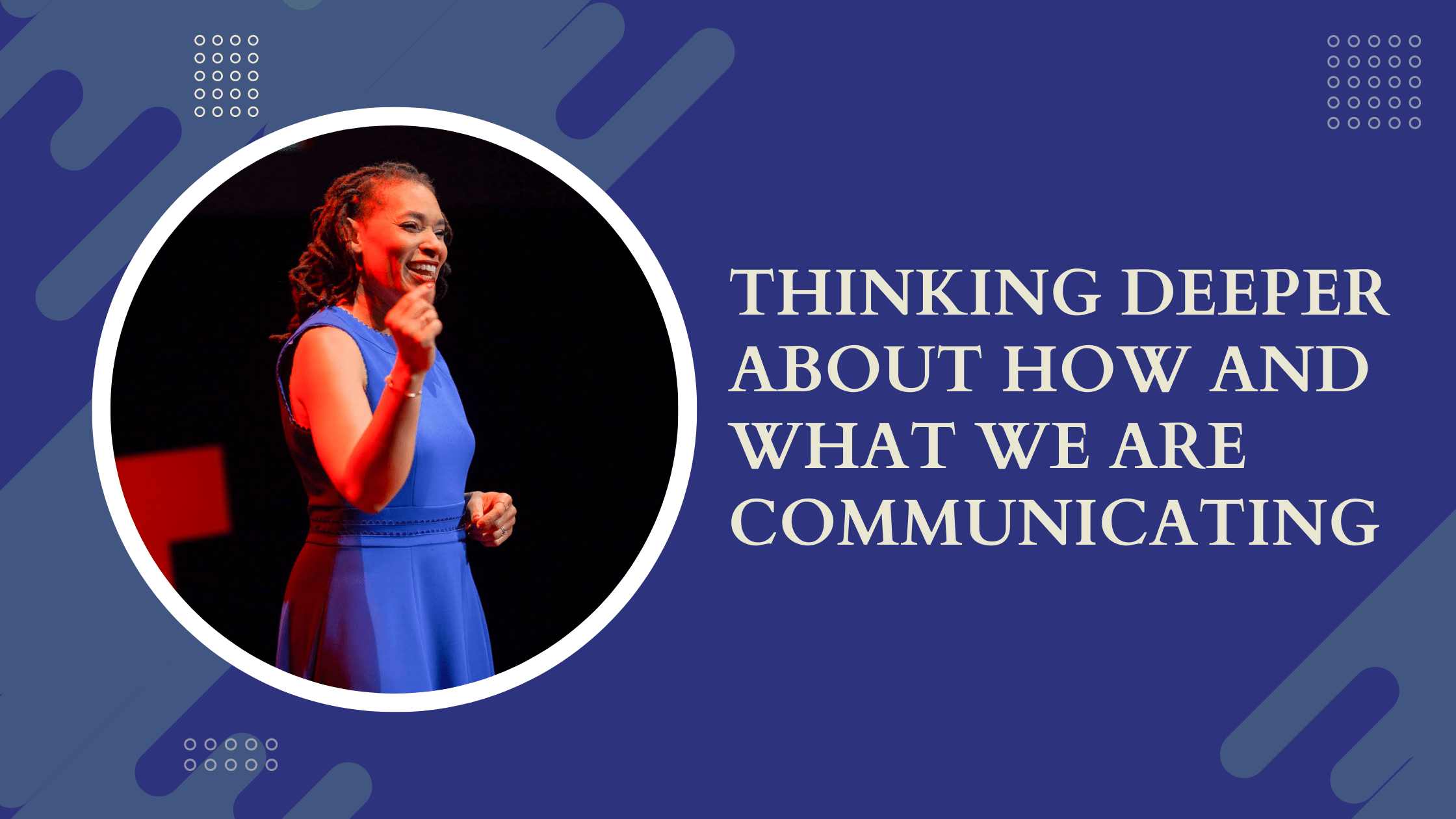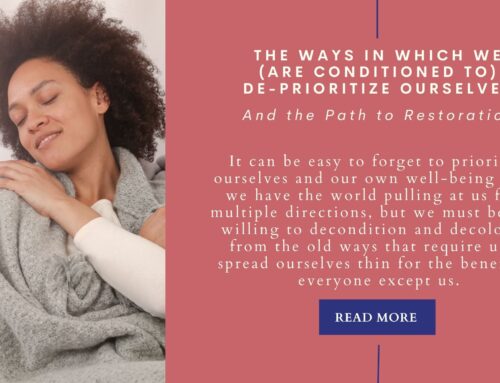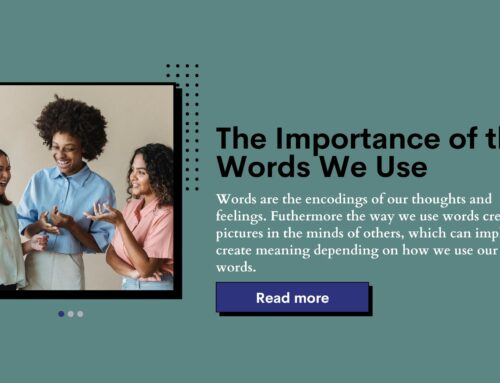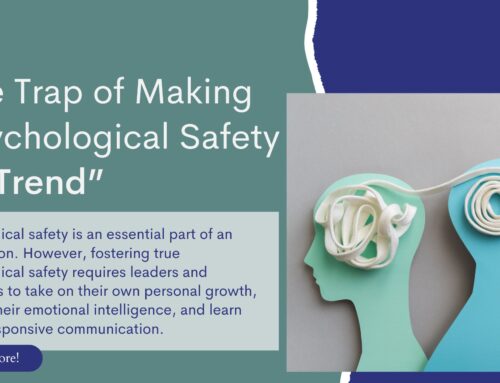
One of the things that NLP Training teaches us is flexibility in communicating. When you learn NLP, you learn to not only be flexible in how you communicate with others, but you also expand your listening so that you can hear beyond the words that a person is speaking and get their world. Becoming more flexible communicators will not only help you to navigate murky waters, but it can also actually save your relationships.
The catch-22 is that even when we are NOT in verbal communication, we are always communicating. We communicate through our facial expressions, tone of voice, body language, eye contact (or lack thereof), and even through the withholding of communication. How many times have you thought you were “hiding your true feelings” and when you finally came out and said what was going on, the other person replied something like, “Oh I already knew you were upset, I was just waiting for you to say something” or “I knew something was wrong, I just figured you’d come to me when you were ready.” The only person that truly suffers when we are not fully aware of communication is ourselves.
Moreover, it is important to be aware, of what we are saying to our family and friends without words. A bad day at work, stress, and negative emotions such as anger, fear, sadness, guilt, and shame can create tension and irritability, and even if we don’t say a word, the people who care about us can sense it, and thus, we can affect them. Becoming aware of how we are communicating first requires becoming aware of our emotions (which I cover in a separate article). Once we become aware of our emotions and can name them accurately, then we can become aware of how we are impacting others in our communications. Here are some questions to ask yourself to help you become aware of how your communication could be affecting others.
Am I being compassionate in my communication?
Do you think about how the other person may feel not only about what you are saying but how you say it? Sometimes it’s not what you say, but how you say it. When we are overly focused on getting our point across we miss how “getting our point across” can make others feel. Try this: before you say something that could potentially upset someone, step into the other person’s shoes then rehearse it in the mirror; or rehearse the conversation with a friend (one that you trust will give you honest feedback) and have them give you feedback on how what you are saying lands. Having this reflected over time will give you a greater awareness and sensitivity in your communication with others.
Am I being honest in my communication?
You’re not a liar. That’s fine. You don’t have to be a liar to communicate dishonestly though. There are many flavors of dishonesty with others that can surface without you consciously realizing it. Do you tell people that you are “fine” when you know that you are not? Do you withhold communication completely when you are upset? Do you “put a smile on your face” and push through days when you are really feeling stressed, overwhelmed, down, or even depressed? This is a dangerous slope to walk. While there may be fear of consequences if we speak up, the danger of keeping quiet when we are NOT OK far outweighs the consequences of getting in communication in the long run. Keeping things inside is the gateway towards the downward spiral that could eventually lead to substance abuse, depression, and at the extreme death.
Am I taking my upset out on innocent bystanders?
Sometimes when we are not completely aware that we are upset, we can make the ones we love innocent bystanders. Ask yourself: do you pick a fight with your spouse or significant other when you are mad at someone else? Do you take out frustrations from the day on your children? These may be hard to admit if you do, however getting that you could be making your family an innocent bystander of your wrath gives you the opportunity to be responsible for your previous misgivings, make amends (meaning ask for forgiveness), and create an entirely new context for these relationships. I didn’t say this was easy, but it gives you the opportunity to reset, recalculate and foster intimacy with those people in your life you care about.

Additionally, it gives you the opportunity to get to the source of the real problem and address it directly (with support if needed) so that it does not continue to eat away and impact the people around you.
Do you acknowledge your mistakes and apologize when you are wrong?
Even though as physicians, some (and even we) expect us to be stone-faced robot gods, we are human, and not only do we have feelings, we make mistakes from time to time. Of course, in our training, it is drilled in us that mistakes are a matter of life and death, and in our profession, that absolutely can be true. However, not ALL mistakes are a matter of life or death.
It may be hard to admit when you are wrong. Perhaps we think we will be seen as weak, stupid, or even incompetent. The truth is that taking responsibility for when we are wrong or have made a mistake takes a high level of courage, and displays a high level of integrity to others (even if what comes out of their mouth is different). Make a practice of admitting when you are wrong (start with little things). A way to do this is to say, “You know you are absolutely right” (rather than saying “I’m absolutely wrong”). Another way to take the edge off of admission of wrong or mistake (as long as it’s appropriate) is to bring a little humor to it at the moment. Of course, make sure it’s appropriate to do so. Use common sense.
Am I a good listener?
Listening is integral to communication. It expresses to others that you care about their feelings and what they have to say. It fosters closeness and intimacy in relationships. In our personal relationships, we are often simply waiting for our turn to speak. After all, we’ve been listening to patients all damn day! We want to be heard too! So we don’t listen. We may even get frustrated and interrupt and give unsolicited advice (even though we are “just trying to help”). Try this on: When you are listening to your partner, friend, or spouse, stop what you are doing and give them your full attention. You may find that you learn something fascinating about them, or they may say exactly what you need to hear. If at the end of the conversation you feel like you haven’t been heard, you can simply ask, “Can I tell you about my day?” Or “Can I tell you what happened to me today?” This will give them a clear indication that you are wanting their attention, so they know exactly what to do. I have created whole courses and workshops on listening that can be found in the resources section of my blog.
Do I give advice that no one wants or asked for?
As physicians, we are “fixers”. We fix problems in patients and give advice all day long. However, in our personal lives, unsolicited advice may be unwelcome. You may mean well but people do not always want advice. Your patients come to you for solutions but your friends and family may just want to talk to you. Spending your days giving medical advice to sick people may get you into the habit of telling people how to fix everything but that’s not always your job as a friend, spouse, or parent. Be clear about what the people that you are talking to need from you. You can do this by asking, “How would you like me to listen to you? Would you like advice or do you just need to talk it out?” This frequently catches people off guard because most people do not even give that consideration. However, after they think about it they can tell you and you can be there for them in the way that THEY need you to be.
Do you give and receive praise well?
There are no words more valuable than “Thank you”. Showing appreciation to your loved one is a powerful way to maintain intimacy. Similarly, when you are given a compliment, give yourself permission to take it in. It’s common (especially for women physicians) for us to blow off compliments and acknowledgments when we are given them. However, if you consider that giving the acknowledgment feels just as good then when you blow off a compliment, when you don’t stop to let it in and even more when you don’t appreciate the compliment being given, it’s like subtly giving the person acknowledging you an eye roll and a big F-You. Here is an exercise: For the next 30 days listen for compliments that people try to give and every time you hear one simply say “Thank you”. Don’t explain it away, dismiss, or blow it off. As well, try giving your spouse, children, or significant other at least one compliment per day, and notice their response to you over time. You may find the compliments coming right back at you, and more so, you may notice an opening for dialogue and intimacy that may have not been previously accessible.
Everything we do all day requires communication, and that is why it’s important to be mindful of what we are and are not saying at any given moment of the day in our communication. Today’s invitation is to take the questions above, journal at the end of each day for the next 7 days (BONUS if you do it for 14 or even 30 days), and notice how your communication shifts. This will give you an idea of what’s possible when you become NLP Certified in your communication. Looking forward to hearing from you!
Maiysha Clairborne MD © 2016
Updated 2022
Want to learn more? Interested in becoming NLP certified? Learn more about our NLP Certification, Coaching, Time Line Therapy®, and Learn Hypnosis, and NLP training by visiting www.mindremappingacademy.com and www.drmaiysha.com.






